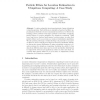Free Online Productivity Tools
i2Speak
i2Symbol
i2OCR
iTex2Img
iWeb2Print
iWeb2Shot
i2Type
iPdf2Split
iPdf2Merge
i2Bopomofo
i2Arabic
i2Style
i2Image
i2PDF
iLatex2Rtf
Sci2ools
151
click to vote
HUC
2004
Springer
2004
Springer
Particle Filters for Location Estimation in Ubiquitous Computing: A Case Study
Location estimation is an important part of many ubiquitous computing systems. Particle filters are simulation-based probabilistic approximations which the robotics community has shown to be effective for tracking robots’ positions. This paper presents a case study of applying particle filters to location estimation for ubiquitous computing. Using trace logs from a deployed multi-sensor location system, we show that particle filters can be as accurate as common deterministic algorithms. We also present performance results showing it is practical to run particle filters on devices ranging from high-end servers to handhelds. Finally, we discuss the general advantages of using probabilistic methods in location systems for ubiquitous computing, including the ability to fuse data from different sensor types and to provide probability distributions to higher-level services and applications. Based on this case study, we conclude that particle filters are a good choice to implement lo...
Related Content
| Added | 01 Jul 2010 |
| Updated | 01 Jul 2010 |
| Type | Conference |
| Year | 2004 |
| Where | HUC |
| Authors | Jeffrey Hightower, Gaetano Borriello |
Comments (0)

